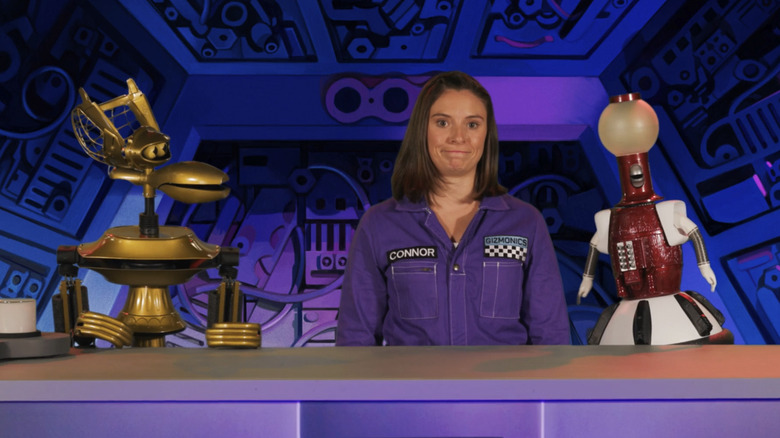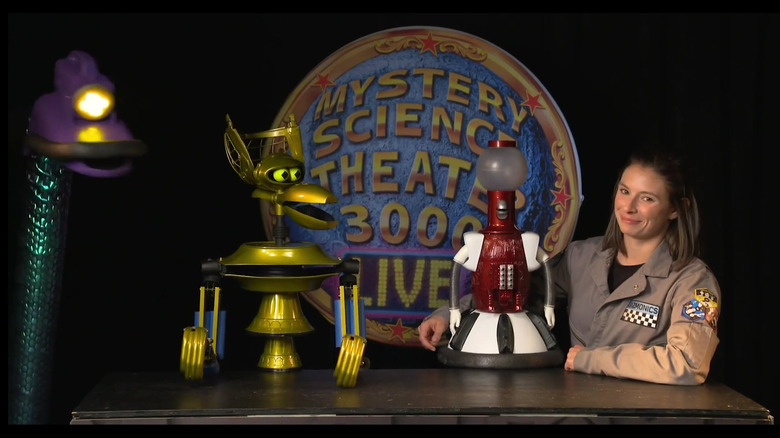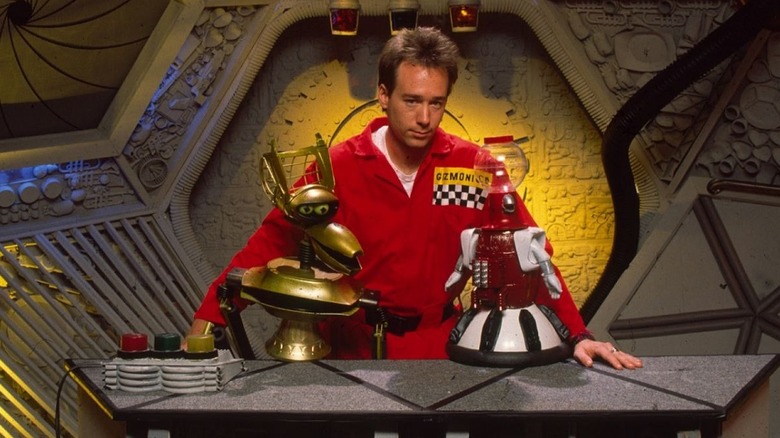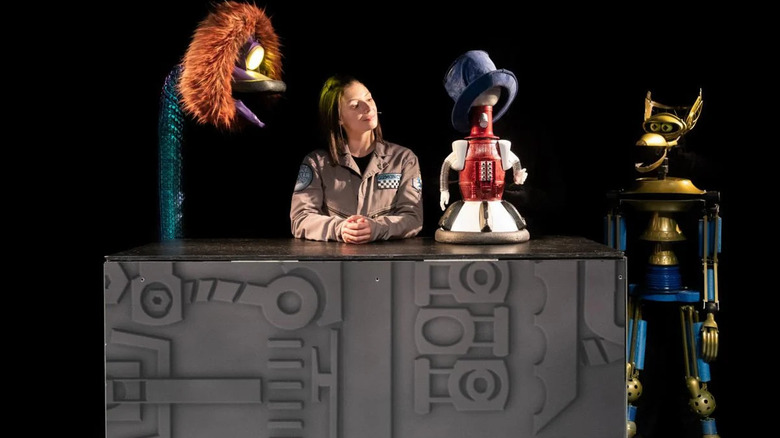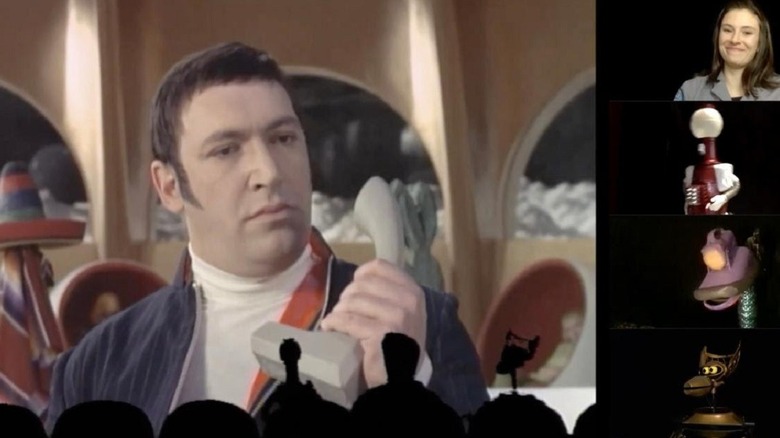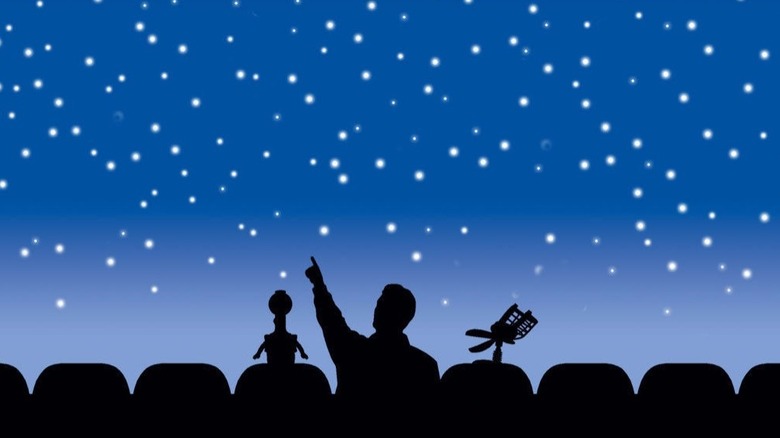Joel Hodgson And Emily Marsh On Season 13 Of Mystery Science Theater 3000 [Interview]
The 11th and 12th seasons of "Mystery Science Theater 3000," now available on Netflix, were a reboot of the series wherein the premise was kept in tact — a space-bound blue collar prisoner is forced to watch, and joke about, extremely bad movies by a pair of mad scientists — but the setting and the cast changed. Jonah Ray was now the central host of the show, the voices of the robots were replaced by a new team of comedians (Baron Vaughn and Hampton Yount), and the mad scientists (Felicia Day and Patton Oswalt) were the children of the original mad scientists. Backed by a Kickstarter campaign, the two Netflix seasons were well-received by fans, and the cast took to production surprisingly well. Show creator Joel Hodgson was impressed.
After those two seasons, however, "Mystery Science Theater 3000" — perhaps surprisingly to some — continued in a subdued fashion. Thanks to a series of live shows, as well as Covid-dictated YouTube marathons, an additional "MST3K" cast was formed. For the live shows, comedian and actress Emily Marsh teamed up with Nate Begle and Conor McGiffin to riff on movies, but also, in a very meta twist, to riff on older episodes of "MST3K."
May 6 will see the debut of The Gizmoplex, a brand new streaming service that will feature many, many older episodes of the show, but also a brand new 13th season wherein the Netflix cast will return to team up with Marsh and her crew.
Marsh and show creator Hodgson sat down with /Film to talk about the Gizmoplex, the technical differences between working on a smaller show vs. a larger one, and developing a rapport with a new team of comedians.
MST3K in the time of Covid
"Mystery Science Theater 3000" started out in the late '80s as a local TV phenomenon. It grew. It split off into various projects over the years. When it came to Netflix, it got this huge set. And now with the Gizmoplex, it seems like you're kind of coming full circle again. It seems a little bit more personal, a little bit scrappy. It's back to feeling a lot more homemade. Is that fair? Does it feel that way when you're making the new show?
Hodgson: I think that's a good way to assess it. Mostly, the way we produced the show for season 13 was really in a reaction to Covid. I got to the idea of Gizmoplex during Covid. We had all this time, nothing was going on, and we just started to develop a bit internally at Alternaversal [the production company]. And so it was kind of like a reaction. By the time we did our Kickstarter, which probably concluded about 13 or 14 months ago, we realized that we wanted to get these shows out as soon as possible, because we just didn't know how long Covid was going to last, and we felt obliged to turn it around a little quicker than we had done previously.
So that just meant rethinking it from the ground up and moving to a version of it where ... I mean, again, when we raised the money, we didn't exactly know how we were going to make the show, because we thought that it'd be possible that we would have to send cameras and green screens and recording equipment and audio equipment to every person's home and then do it that way and do it remotely.
Marsh: Right. Could we even be in the same room together?
Hodgson: Yeah, exactly ... [We] truly didn't know that we would be able to be in the same room, so that moved to a model that was a little bit more easy to manage, which was to simply have two studios, one on the East Coast and one on the West Coast, where we could record stuff. But it did mean we couldn't build sets like we used to, so we had to move to doing it on a chroma key and basically figuring it out that way, which was really strange for me, because so much of MST has always been about that in-camera world of the show and everything was built.
So we had to put a lot of extra time in developing that, making sure that felt comfortable and making sure that would look okay on screen and make people feel like it was unique. It was different, but it felt familiar. So that was kind of the goal. And we're really thrilled with it. We're really so grateful we were able to pull it off, but it was, simply put, the hardest season because of Covid. It really was. So we're so glad to be on the other side of it and that the shows are looking good and they're funny, but man, this was pulling down a horse, this one.
'So we don't have as high standards now. Thank God'
And from what I understand, the Netflix seasons were much larger animals than this, just because they were studio productions.
Hodgson: Yeah. We had more money because we got the license from Netflix and we got the money from the fundraiser. So we had more money than to do that kind of thing. And of course, pre-Covid. So you could do stuff like that. So had a lot to do with it.
What sort of things can you do with a Kickstarter-backed project that you couldn't do making the show under the auspices of a larger entity?
Hodgson: There's not too much. There's not too much different. I know that deliverables later downstream, like we're doing things like the audio kind of treatment, that when it goes into streaming, we'll have a five/one split, they call it — that has to be on there. We don't need that for the Gizmoplex, but in other formats, they kind of like it. So that's an additional thing that we don't have to do in the Gizmoplex. We don't have that. So it's little technical things like that, but there are less restrictions on deliverables.
For example, our CEO, Mike Oeth, has just gone through the Netflix contract. It's 100 pages long. And he said, the real meat is the first six or eight pages. And then the rest is all technical specs for deliverables. And so those are all the things you have to meet. And it really is a lot because it goes ... I mean, they just have really high standards, obviously, for the work. So we don't have as high standards now. Thank God. Technical standards. Yeah. But it comes down to the fans and what they think, and it's mostly just waiting and seeing how they like it. And the backers, we just got [a] survey back, and they really seem really content and happy with what we've done. So it's looking good.
The meat face and the chaos Muppets
Emily, you're taking over something that Joel started, and I know being the host of the original "Mystery Science Theater 3000" was extrapolated from Joel's sort of stage persona, his stand-up persona. When you take over as host, are you looking back at the previous hosts a lot and trying to see how their personalities as performers inform the show? Or are you inventing something from whole cloth?
Marsh: That's such a great question. Because obviously, I think it would be fair to say — I'm looking at Joel out of the quarter of my eye — is that hosts have used some of their life tendencies, like who they are in real life, to bring to their host persona. Once you meet Joel Hodgson, you definitely see Joel Robinson. That would be hilarious to go totally method on a host for MST3K and be like, "I am nothing like my character." So I definitely look to the past to see.
I think there's an earnestness to the host characters because they have to be this sort of straight man to the two chaos Muppets that are the 'bots and all the antics they get into. So I definitely did look to the past, that the host kind of has to be this grounding face, like an actual meat face that can emote for the audience to cling onto and kind of serve as the interpretation for how to interact with the rest of this world that you're being presented with, with the 'bots, with the movie.
So knowing that's kind of your role and responsibility and then trying to, I think earnestly, be myself. Maybe a slightly heightened version of myself, because I do like bringing my enthusiasm [and] my naïveté maybe up a little bit for the "MST3K" world, because I think it's really fun to have a host that ... I think Joel was almost more of like more of a fatherly figure to the bots, like taking care of them. Mike Nelson is sort of like the older brother. They start being a little more peers. Then you get into Jonah, where the bots are just, like, actively making fun of him, and you're getting more and more to the peer level. And in my conceit, in my mind, I liked finding opportunities where what if Emily, the host, is almost like this dark situation where she is being mentored by the bots, like sometimes is more susceptible than any host before to their ideas?
So in my mind, I always like was kind of looking for little opportunities to integrate that. It's like, "Oh no, what if this human host has become susceptible to the bots in a way that was never allowed before?" But definitely, I would be the first to say definitely experimentation, but always being conscious of trying to bring myself to Emily Connor as much as possible.
We are The Monkees
Hodgson: I wanted to talk about that too, because I think the way I look at Emily, too, is we did my farewell tour together. So we did that, and she got to start riffing in front of a live audience. We kind of built it into this show. Right? We did a section, every show where she –
Marsh: I think technically, Joel, it was even a little more like, "Hey, what do you think about riffing a little bit during the show?" And then quelling inner fear and you go, "I love that. Let's do it. What's the worst that could happen?"
Hodgson: Right. And then on top of that, not only was this really a hard season, but we also did a live tour during Covid. And the reason I bring it up is because Emily and her crew, the cast that you're going to meet when she gets to do her first episode, have been through it together and had to work it during Covid. And the people that would come out during Covid and a cast that would go out during Covid. And so my impression is, it's really road-tested. These people that are this new cast, they're not just clever actors that are coming together, but they've been together for a long, long time, performing and having to take those audiences and just turn it into something.
Marsh: Also, a testament to Joel's ability — all of us from the live tour had responded to a random New York City audition notice for the live tour, and none of us knew each other before this show. But as a testament to Joel just happened to pick ... I mean, you just have a really good eye for who's going to work well together. And it easily could have been — we're a small group. You could have picked somebody who was just like, "Wow, that person's really a pain in the butt. I can't believe we picked them." But it was so obvious from the first day of rehearsing that all of us just had this bond and this ensemble working together. And it was so fun to bring it to filming after we'd been on tour for all that time.
You pulled a Monkees.
Hodgson: Yeah. We are The Monkees
Marsh: That's a great, great comparison.
Into the Multiverse, MST3K-style
Emily, you were on this live tour with Nate Begle and Conor McGiffin, who are playing the 'bots. Surely, working on the road for a long time, you develop a rapport and you learn to bounce off of each other comedically. Are you going to be working with Baron Vaughn and Hampton Yount now? If you're working through different cast members, how do you develop a new rapport with the new cast?
Marsh: That's a great question. And it reminds me, because the one thing we did have for this season that Joel had mentioned was our Covid restrictions. So we also had scheduling restrictions because we filmed our episodes on the East Coast. And then we're basically, the next day, thrown into a van to start rehearsing our live tour, and to start touring while the West Coast [team] was filming their episodes.
So Covid restrictions and schedules kept the two casts apart. But the crossover that we did have is that Jonah came in to direct our East Coast episodes. As a result, we got to do a lot of filming together for repurposing some episodes, doing some things. So it felt like that got to be our chance to sort of start syncing the two casts, because I truly can't say enough wonderful things about Jonah. He is such a gem of a person.
What was also nice, too, is doing live online events over the summer, where we would do live riff-along events. I got to do ones with Baron, with Hampton, doing online events. And it felt, even not being in the same room with those guys, I think the shared love and the same niche of being a part of this universe ... even having not been on the road together, it was great to have that common vocabulary of, "You love 'Mystery Science Theater,' you love bad movies. This is comedy." And to have that bring us all together instantly was so nice to share that bond with them.
Hodgson: Yeah. Yeah. I just wanted to say, too, that within the context of the season, the other thing that made it so complicated was we have three hosts and at least two people on each robot, two different casts on each robot, and GPC and GPC-2. And it was kind of like all those things working together, you really get the feeling. It all does kind of blend at a certain point, especially around the final episode, where basically we're all riffing together. So it's quite a production at the end. So that's cool to do that.
Marsh: It's an Into the Multiverse, MST3K-style.
Season 13 of "MST3K" debuts on The Gizmoplex on May 6, 2022.
